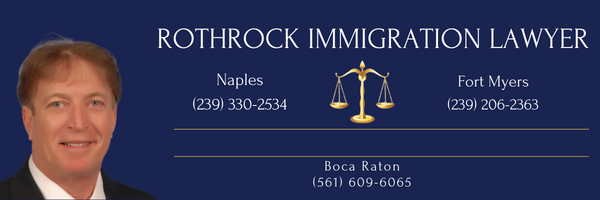L Visa Attorney Naples | Free Initial Consultation
L Visa Rothrock Immigration Lawyer
L visas are specifically designed to facilitate the needs of intra-company transfers by companies. There are two different L-1 visa classifications: L1-A and L-1B. Carl Rothrock is an immigration attorney in Cape Coral, Fort Myers, and Naples. He files L Visas, including L1, L1-A, L1-B, blanket L1 visas, and L2 visas. The L-1 visa is a temporary visa that allows foreign employees to work in the United States. The employee must have worked for a subsidiary, parent, affiliate, or branch office of the company for at least one year out of the last three years. The U.S. company must be a parent company, child company, or sister company to the foreign company. The L-1 visa may also include non-profit, religious, or charitable organizations.
The L-1 visa is a good way for small or start-up overseas companies to expand their business and services to the United States. This is advantageous to smaller companies because it allows for the transfer of a highly proficient manager or executive who has direct knowledge of operations, allowing the setup of a new branch in compliance with the goals and objectives of the company’s main office. However, since the USCIS will scrutinize L visa petitions filed by lesser-known companies more closely, professional consultation with an experienced immigration lawyer is strongly recommended for these types of small businesses.
L-1 visas can also be used by multi-national companies. When a multi-national company is developing a new market in another country, it may become necessary to have some employees with specialized knowledge work in the newly established office. Furthermore, such companies may have policies of international rotation of managerial level personnel to assure that all key personnel within a company have equal opportunity for career advancement when an appropriate position becomes open in any location around the world. Cross-fertilization of ideas among high level employees and executives enhances a company’s competitiveness; this exchange often results in innovation essential to a company’s reputation and development. A regular rotation of key personnel improves and ensures uniformity of service and procedure within the company at a global level.
L-1A Visas: Intracompany Transferee Executive of Manager
-
- L-1(a) visas are designed for intra-company transferees coming to work in the United States. The L-1A visa applicant must be a manager or executive of the foreign company.
- The L-1A visa holder must have been employed in an executive or managerial capacity for the foreign company at an overseas location continuously for at least one year out of the past three years.
- The L-1A visa allows a company which does not currently have a U.S. office to send an executive or manager to the United States to establish a company in the U.S.
- The maximum length of the L-1A visa is seven years. The L-1A visa is granted initially for one year for a new company in the US or three years for a US company with more than one year in existence, with extensions available in two-year increments, with a total stay not to exceed seven years.
- The L-1A visa is a dual intent visa, which means that the L visa holder may disclose to the U.S. government that he or she intends to apply for permanent citizenship eventually. Many other types of business visas, such as the E1 and E2 treaty visas, are temporary visas and will be rejected if the applicant discloses that he or she intends to reside in the U.S. permanently.
- The L-1A visa is flexible. The holder may travel back and forth between his or her home country and the United States. Unlike other types of visas, the holder is not required to live in the United States or the foreign country and may travel between the two countries.
- The L1 visa holder may bring his or her spouse to this country under an L2 visa. The L2 visa is also a dual intent visa. The L2 holder may work in the United States under an Employment Authorization Document (EAD) and the duration of the L2 visa is the same as the L1 visa holder.
- If the L-1A visa holder wants to adjust his or her status from a temporary visa to a permanent one, he or she may apply for an EB-1C visa for permanent green card status. The applicant of the EB-1C visa can also sponsor his or her spouse and children for permanent immigration.
- Labor certification is not necessary for the L-1A applicant applying for the EB-1C, resulting in a significant amount of time and money being saved.
L-1B Visas: Intracompany Transferee Specialized Knowledge
- L-1B visas are designed for professional employees with specialized knowledge.
- Companies that do not have currently have an office in the United States can use the L-1B visa to send over an employee with specialized knowledge to help establish a new company.
- Companies that currently have an office in the U.S. can use the L-1B visa to send over an employee with specialized knowledge to assist the current company with proprietary knowledge about a company’s product.
- The maximum length of the L-1B visa is five years. Usually, the L-1B visa is issued for three years with a two-year extension.
- The L-1B is a dual intent visa, meaning the visa holder may declare his or her intent to eventually become a U.S. citizen.
- The L1 visa holder may bring his or her spouse to this country under an L2 visa. The L2 visa is also a dual intent visa. The L2 holder may work in the United States under an Employment Authorization Document (EAD) and the duration of the L2 visa is the same as the L1 visa holder.
- The L-1B visa is flexible. The holder may travel back and forth between his or her home country and the United States. Unlike other types of visas, the holder is not required to live in the United States or the foreign country and may travel between the two countries.
- For an alien in L-1B status, he/she may apply for a Green Card as a skilled worker, which requires an approved labor certification. If circumstances allow, he/she may apply under the EB-1(a), EB-1(b), or NIW categories, for which a labor certification is not required. The applicant for permanent immigration may also sponsor his or her spouse and children.
Blanket L-1 Visas
- The “L-1 Blanket Petition Program” allows large multi-national companies and frequent users of the L-1 visa category to receive one approval from the government to transfer a certain number of employees to the United States rather than filling out separate applications for each employee.
- The L-1 holder must leave the United States for minimum of one year and must work for foreign operation of the U.S. Company before becoming eligible to reapply for an L visa.
- Full-time employment is not required to maintain L visa status, but the employee “must dedicate a significant portion of time on a regular and systematic basis” to the company while in the U.S. Even though the L1 visa holder must be employed on a full-time basis with the company, foreign worker does not necessarily have to be working in the U.S. on a full-time basis. Foreign worker is allowed to divide work between the U.S. and home country.
L2 Visas
The L1-A or L1-B visa holder may bring his or her spouse to this country under an L2 visa. The L2 visa is also a dual intent visa. The L2 holder may work in the United States under an Employment Authorization Document (EAD) and the duration of the L2 visa is the same as the duration of the L1 visa holder.

